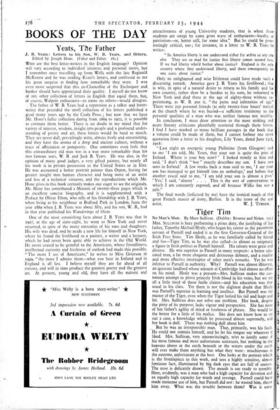BOOKS OF THE DAY
Yeats, The Father
WHO are the best letter-writers in the English language? Opinion will vary according to individual interests and personal tastes, but I remember once travelling up from Wells with the late Reginald McKenna and he was reading Keats's letters, and confessed to me his great surprise at finding how remarkable they were. I was even more surprised that this ex-Chancellor of the Exchequer and banker should have appreciated their quality. I myself do not know of any other collection of letters in English that equal them, but, of course, Walpole enthusiasts—to name no others—would disagree.
The father of W. B. Yeats had a reputation as a talker and letter- Writer that preceded the small collection of his letters published a good many years ago by the Cuala Press ; but now that we have Mr. Hone's fuller collection dating from 1869 to 1922, it is possible to estimate them better. There is no doubt in my mind that for variety of interest, wisdom, insight into people and a profound under- standing of poetry and art, these letters would be hard to match. They are never dull, prevailingly witty, always lively and entertaining, and they have the aroma of a deep and ancient culture, without a trace of affectation or pomposity. One sometimes even feels that this extraordinary old man was in a way more remarkable than his two famous sons, W. B. and Jack B. Yeats. He was also, in the opinion of many good judges, a very gifted painter, but nearly all his work is in private possession in the United States or in Eire. He was accounted a better portrait painter than Orpen, having far greater insight into human character and being more of an artist and less of a technical virtuoso, and the reproductions which Mr. Hone gives in this book certainly makes one eager to see the originals. Mr. Hone has contributed a Memoir of twenty-three pages which is an excellent concise biography, and it is supplemented with a Preface by Oliver Elton, who tells of his friendship with J. B. Yeats, when living as his neighbour at Bedford Park in -London, from the year 1889 when J. B. Yeats was about fifty, and his son, W. B., had in that year published his Wanderings of Oisin.
One of the most astonishing facts about J. B. Yeats was that in 1907, at the age of sixty-eight, he went to New York and never returned, in spite of the many entreaties of his sons and daughters. His wife was dead, and he made a new life for himself in New York, where he found the livelihood as a painter, a writer and. a lecturer, which he had never been quite able to achieve in the Old World. He never ceased to be grateful to the Americans, whose friendliness, intellectual curiosity and freshness of outlook had made this possible. "The more I see. of Americans," he writes to Miss Grierson in 1999, " the more I admire them—what you hear in Ireland and in England is all lies. I believe myself they are far ahead of all nations, and will in time produce the greatest poetry and the greatest art. At present, young and old, they have all the naïveté and attractiveness of young University students, that is when those students are swept by some great wave of enthusiasm—loyalty or patriotism—or, better still, for some idea." But he could be pene- tratingly critical, too ; for instance, in a letter to W. B. Yeats he writes :
" In America liberty is not understood either for artists or any one
else. They are so mad for justice that liberty comes second best. If we had liberty who'd bother about justice? England is the only country where they understand liberty, and there consequently no one cares about justice."
Only an enlightened and wise Irishman could have made such a
discerning remark. America gave J. B. Yeats his livelihood ; that is why, in spite of a natural desire to return to his family and his own country, rather than be a burden to his sons, he remained in New York and died there at the age of eighty-three without ex- periencing, as W. B. put it, " the pains and infirmities of age." There were 25o personal friends (at only twenty-four hours' notice) at the church where he was buried—a sufficient testimony to the personal qualities of a man who was neither famous nor wealthy.
In conclusion, I must draw attention to the most striking and acute literary criticisms plentifully scattered through these letters. I find I have marked so many brilliant passages in the book that a volume could be made of them, but I cannot forbear one more quotation from a letter to his daughter, Lily Yeats, dated June 23rd, 1918: " Last night an energetic young Philistine (from Glasgow) said to me I am told, Mr. Yeats, that your son is quite the poet of Ireland. Where is your boy now? ' I looked stonily at him and said, I don't think " boy " exactly describes my son. I have two sons in Ireland.' A few weeks back a man said to me, ' I see your son has managed to get himself into an anthology,' and before that another rascal said to me, I am told your, son is almost a poet' Yes,' I said, almost' . . This is the sort of conversation to which I am constantly exposed, and all because Willie has not a title."
The final words (italicised by me) have the ironical touch of that great French master of irony, Berlioz. It is the irony of the real


























 Previous page
Previous page